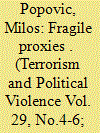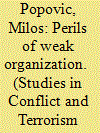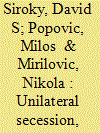|
|
|
Sort Order |
|
|
|
Items / Page
|
|
|
|
|
|
|
| Srl | Item |
| 1 |
ID:
175434


|
|
|
|
|
| Summary/Abstract |
Major powers have long used cultural institutes to enhance their appeal in foreign countries. As aspirant powers, Russia and China have recently launched cultural institutes of their own with the aim of improving their international reputations. However, the location and operations of the Confucius Institutes and Russkiy Mir Institutes often seem to run counter to these aims. Drawing on policy diffusion theory (PDT), we argue that these choices are less the product of strategic calculation than of policy emulation and decoupling. Using a mixed methods approach, we show that, while the Confucius Institutes and Russkiy Mir Institutes were modelled after their Western counterparts (emulation), China and Russia have operated their institutes in ways that go against the principles of cultural diplomacy (decoupling). An analysis of field research on these institutes suggests more overall decoupling with Confucius Institutes than with Russkiy Mir Institutes, which might help account for the relatively greater backlash against the Confucius Institutes in their host countries.
|
|
|
|
|
|
|
|
|
|
|
|
|
|
|
|
| 2 |
ID:
156909


|
|
|
|
|
| Summary/Abstract |
Foreign governments frequently intervene in armed conflicts by sponsoring rebels against their adversaries. A sponsorship is less costly than a direct military intervention, but rebels often defy orders, desert fighting, or turn guns against their sponsors. Under what conditions do rebels defect against their sponsors? Drawing on organizational theory, I argue that as rebel organizations become less centralized and formalized, the rebels are likely to defect against their sponsors. This occurs because non-centralized organizations have weak central leadership and allow for dispersed decision-making, both of which narrow the manipulative capacity of sponsors. Due to these disadvantages, non-centralized rebel movements are less accountable to their sponsors, cannot credibly commit to rapidly change their policies in response to changes in the sponsor’s demands, and suffer from frequent and destructive quarrels between the top and lower echelons. Using multilevel logistic models for panel data, I test my argument on a novel dataset. My quantitative analysis shows that rebel structure is a robust predictor of defection.
|
|
|
|
|
|
|
|
|
|
|
|
|
|
|
|
| 3 |
ID:
141294


|
|
|
|
|
| Summary/Abstract |
Why do some militant groups defect against their sponsors, while others remain loyal? Pakistan's sponsorship of Jaish-e-Mohammad and Lashkar-e-Taiba offers a controlled case comparison as the former turned its guns against Islamabad, while the latter remained obedient despite a similar strength, ethnic ties to the regime, and the presence of alternative supporters. What explains Jaish's defection and Lashkar's loyalty? Drawing on organizational and principal-agent theory, I argue that militant organizations that are more decentralized and factionalized are more likely to turn on their sponsors, because their weak command and control as well as dispersed decision making limit the militant leaders' ability to follow through on their commitments to the sponsors and makes it more difficult for the sponsors to discipline the militant organization. When a sponsor attempts to coerce such organizations into submission by detaining militant leaders, freezing or confiscating their material assets the rank-and-file is likely to turn guns against the sponsor.
|
|
|
|
|
|
|
|
|
|
|
|
|
|
|
|
| 4 |
ID:
189000


|
|
|
|
|
| Summary/Abstract |
How does exposure to aerial bombing influence voting for the target country’s leadership? Do voters tend to punish incumbents for policy failure? These questions are relevant for understanding the target country’s postwar politics because aerial bombing remains one of the deadliest and most widely used military options for coercive bargaining. Despite the historical and contemporary relevance of these questions, there are only a few studies in the air-power literature arguing that strategic bombing produces a temporary rally effect but no subsequent political consequences other than political apathy. Most studies ignore important variation within states even though leadership responsibility can vary tremendously on the substate level. This article analyzes the effect of the 1999 NATO bombing of Yugoslavia on Serbian local elections using the difference-in-differences identification strategy and identifies the effect of airstrikes on the vote-share of Slobodan Milosevic’s regime. The results show that the regime’s vote-share is 2.6% lower in municipalities exposed to the bombing. Challenging prior studies, this finding demonstrates that retrospective voting applies to aerial bombing even in competitive authoritarian regimes.
|
|
|
|
|
|
|
|
|
|
|
|
|
|
|
|
| 5 |
ID:
182671


|
|
|
|
|
| Summary/Abstract |
Recognition of aspiring states from established countries is central to becoming a member state of the international system. Previous research suggests that great power recognition decisions regarding aspiring states rapidly converge toward either recognition or non-recognition, yet great power convergence has still not occurred in the case of Kosovo after more than ten years. Unilateral secessions typically remain wholly unrecognized, since they violate the norm of home state consent, yet Kosovo has now been recognized by more than 100 countries. Why do some countries extend recognition to unilateral secessions, and do so early, whereas others delay recognition or withhold it altogether? In the case of Kosovo, great power influence and contestation, rather than convergence, have played a key role in shaping recognition decisions. We argue that countries in the US sphere of influence, with strong economic and military ties, are more likely to recognize Kosovo and to do so relatively fast, whereas countries influenced by Russia are less likely to recognize Kosovo at all, or to do so only after an extended delay. However, great powers are not equal in influencing other states to adopt their preferred position, since the USA is more powerful than Russia and can benefit from working alongside allies within the Western-oriented world order. We estimate a non-proportional Cox model with new time-varying data on Kosovo recognition and provide evidence that US military ties influenced other countries in extending recognition to unilateral secession.
|
|
|
|
|
|
|
|
|
|
|
|
|
|
|
|
|
|
|
|
|